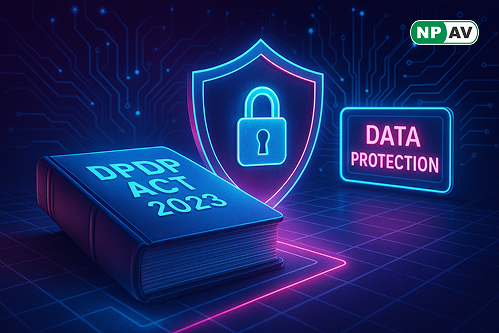The DPDP Act, 2023: Essential Guide for Businesses on Data Protection in India

India’s Digital Personal Data Protection (DPDP) Act, 2023 is the country’s first dedicated law on digital personal data. It introduces rules that balance an individual’s right to privacy with the need for businesses to process data responsibly.
- What is the DPDP Act?
The DPDP Act lays down principles for how personal data should be collected, stored, processed, and shared. It ensures that individuals have greater control over their digital information while businesses maintain lawful and secure data practices. - Who Needs to Comply?
The law applies to:
All businesses in India that collect or process personal data.
Foreign companies that handle data of Indian citizens.
Vendors, partners, and third-party agencies working with personal data.
Even small businesses and startups are included, since compliance depends on the type of data handled, not just company size.


- Key Roles Under the Act
Data Principal → The person whose data is collected.
Data Fiduciary → The business or entity deciding how and why data is processed.
Data Processor → A third party processing data on behalf of the fiduciary.
Important: The Data Fiduciary remains fully accountable, even if a processor mishandles the data. - Core Obligations for Businesses
Businesses must follow certain principles:
Consent-first approach → Collect data only after clear, informed consent.
Purpose limitation → Use data strictly for the reason it was collected.
Data minimization → Ask only for data that is necessary.
Storage limitation → Keep data only as long as required.
Transparency & accountability → Be able to prove compliance at all times.


- Rights of Individuals (Data Principals)
The Act grants individuals the right to:
Access their personal data.
Correct inaccuracies.
Request deletion of data.
Withdraw consent.
File grievances for misuse of data.
- Penalties for Non-Compliance
Fines up to ₹250 crore per violation.
Public trust and brand reputation can be severely damaged after a breach.
Businesses remain liable even if a third-party vendor causes the data loss.
- Why It Matters Now
Data is one of the most valuable assets today. Mishandling it can result in both legal consequences and loss of customer trust. With stricter global privacy laws (like GDPR), Indian businesses must also align with these global standards to remain competitive.
NPAV offers a robust solution to combat cyber fraud. Protect yourself with our top-tier security product, Data loss Prevention
Comment(s)






